
Circumcision has long been marketed as “normal” in many parts of the world, particularly in the U.S., where generations have been conditioned to accept it without question. But here’s the truth: most of the world doesn’t cut their baby boys. In fact, many cultures stand firmly against it—viewing it as unnecessary at best and barbaric at worst.
The deeper you dig, the more you realize that circumcision isn’t some universal standard of hygiene or health—it’s a cultural and religious relic. It survives on outdated beliefs, medical misinformation, and a reluctance to question the status quo. Meanwhile, countless societies across the globe see it for what it is: an unnecessary violation of bodily autonomy.
So, who are these cultures that reject circumcision? And what can we learn from them? Let’s break it down.
1. The Intact Majority of Europe
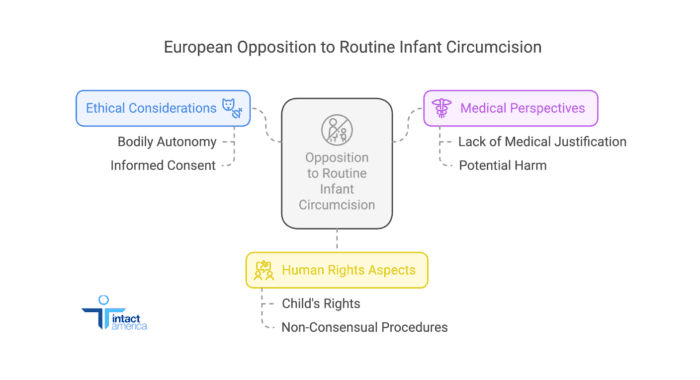
Why They Oppose It: Bodily autonomy, human rights, and medical ethics
Most European countries don’t practice routine infant circumcision—and they never have. In places like Germany, France, Italy, Spain, and the Netherlands, the idea of cutting a baby’s genitals for non-medical reasons is considered absurd, even unethical.
European doctors don’t push circumcision because they follow the data: There’s no legitimate medical reason for it. The American Academy of Pediatrics may dance around the issue, but European medical boards are blunt—circumcision is unnecessary and potentially harmful.
Even in Scandinavia, where people are famously reserved about personal matters, circumcision is openly debated as a human rights violation. Norway, Sweden, Denmark, and Finland have all considered banning non-consensual circumcision, viewing it as a violation of a child’s bodily autonomy. In Iceland, an outright ban was proposed in 2018, arguing that “the rights of the child should always be greater than the rights of the parents.”
Lesson: Europeans prioritize informed consent and human rights over cultural tradition. They see circumcision for what it is—a non-consensual, irreversible medical procedure on an infant with no valid justification.
2. The Japanese View on Circumcision
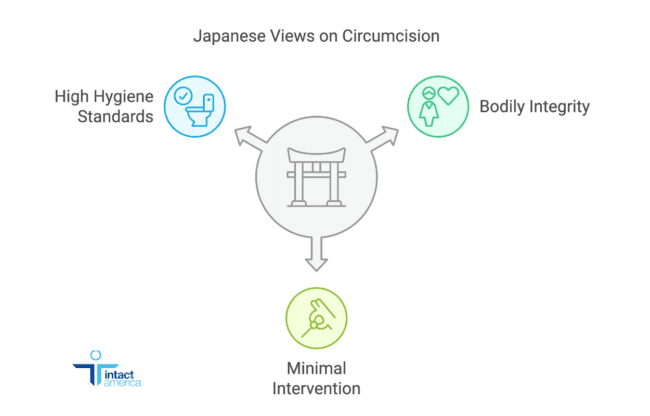
Why They Oppose It: Respect for the body, minimal medical intervention
In Japan, circumcision is virtually unheard of. Japanese culture places a strong emphasis on bodily integrity and non-intervention. Historically, their approach to medicine has been conservative—they believe in letting nature take its course unless intervention is absolutely necessary. Circumcising a healthy baby? That would be unthinkable.
Even as Western influence has crept in, Japan has resisted the circumcision trend. The idea of cutting an infant for “cleanliness” doesn’t hold water in a country known for some of the highest hygiene standards in the world. Their low rates of infections and diseases prove that proper hygiene beats unnecessary surgery every time.
Lesson: Japan trusts the human body’s natural design. They don’t believe in fixing what isn’t broken—especially not in newborns.
3. The Intact Men of Latin America
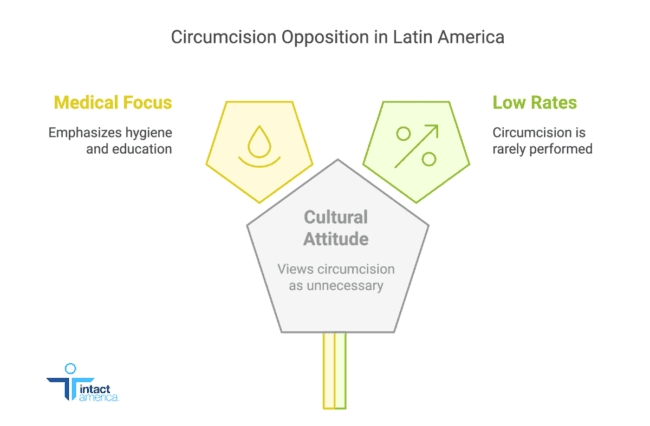
Why They Oppose It: Circumcision is seen as unnatural and unnecessary
Across Mexico, Brazil, Argentina, Chile, and most of South America, circumcision is not a thing. Unlike the U.S., where circumcision rates once hovered above 80%, Latin American countries never bought into the surgical trend.
Why? Because they never needed to. Doctors in these regions don’t see circumcision as a medical necessity. Instead, they focus on proper hygiene and education, both of which eliminate the supposed “need” for circumcision.
The cultural attitude is simple: Why would you cut part of a baby’s body off when there’s no reason to?
Lesson: Latin American cultures see circumcision for what it is—a completely unnecessary surgical intervention that serves no real purpose.
4. Indigenous Tribes That Reject Circumcision
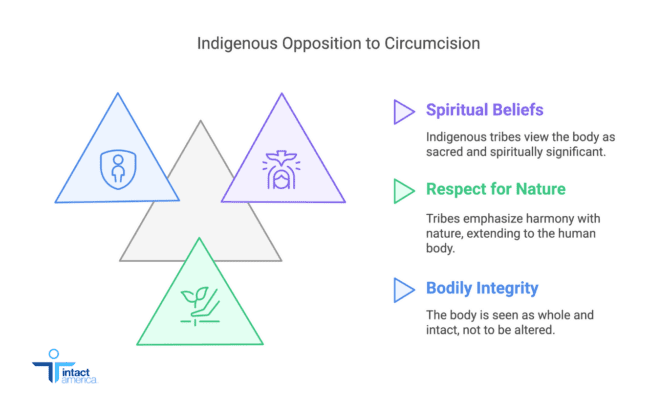
Why They Oppose It: Spiritual beliefs, respect for nature, and bodily integrity
Many Indigenous cultures around the world view the body as sacred and believe it should be left intact. Tribes in Africa, the Amazon, and the Pacific Islands often have strong spiritual beliefs surrounding bodily integrity.
For example, among many Indigenous Australian groups, circumcision was never a widespread practice. Some tribes do perform coming-of-age rituals involving circumcision, but many reject the practice outright—believing that the body should remain as it was created.
Similarly, in many Native American traditions, bodily integrity is deeply respected. In tribes across North America, circumcision was not a part of traditional culture—it was introduced later through colonization and missionary influence.
Lesson: Indigenous wisdom teaches that the human body is meant to be whole. Circumcision is seen as an unnatural violation of this principle.
5. Chinese Culture and the Belief in Wholeness
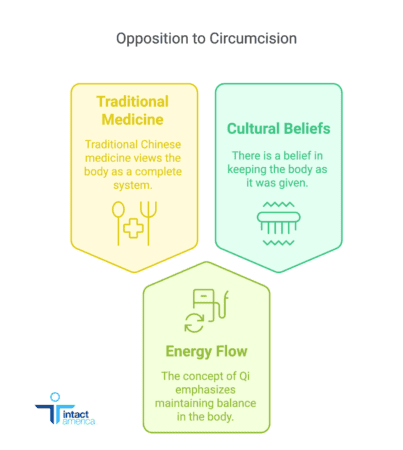
Why They Oppose It: Traditional medicine, energy flow, and cultural beliefs
In China, circumcision is not a common practice. Traditional Chinese medicine views the body as a complete system where every part has a function. The idea of removing a body part without necessity is counterintuitive to this philosophy.
Even modern Chinese medicine follows this logic—circumcision is only performed if absolutely required due to medical necessity. The concept of Qi (energy flow) emphasizes maintaining balance in the body, and cutting a healthy part of a baby’s body is seen as a disruption of this balance.
China’s aversion to circumcision is not just medical but cultural. There’s a longstanding belief in keeping the body as it was given—a belief that aligns with many non-circumcising cultures.
Lesson: China’s approach reinforces the idea that the body is already complete—circumcision is an unnecessary interference with nature’s design.
6. The Growing Anti-Circumcision Movement in the U.S.
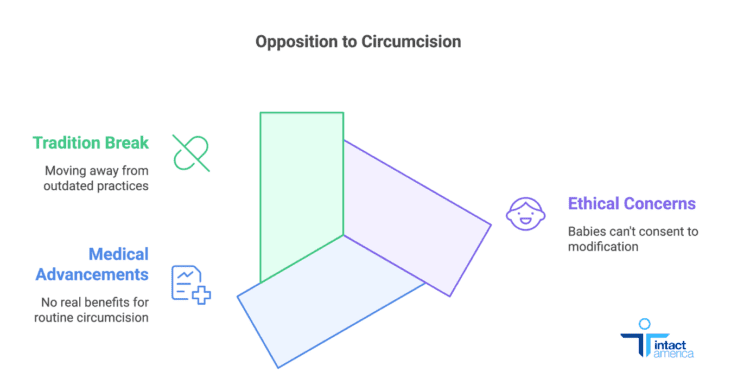
Why They Oppose It: Bodily autonomy, ethics, and medical misinformation
Even in the U.S., where circumcision was once the default, attitudes are shifting. The intactivist movement (a term for activists against forced circumcision) is gaining momentum. Parents are starting to question the outdated medical justifications for circumcision, realizing that cleaning a baby’s penis is not rocket science.
More and more American parents are saying NO to circumcision, citing:
- Ethical concerns—babies can’t consent to permanent body modification.
- Medical advancements—studies show no real benefits that justify routine circumcision.
- A desire to break free from outdated traditions—circumcision was originally pushed in the U.S. to “curb masturbation.”
You might also like reading “The U.S. Circumcision Crisis: Why Your Support Matters”
With intact rates rising in states like California, Washington, and Oregon, it’s clear that Americans are waking up. The next generation might finally leave this outdated practice behind.
Lesson: The U.S. is slowly catching up to the rest of the world. The more people question circumcision, the faster it will fade into irrelevance.
Final Thoughts: The Rest of the World Knows Better
What do all these cultures have in common? They trust the human body. They don’t see circumcision as a necessity because it isn’t one.
The idea that circumcision is “normal” is a geographically limited illusion—one that persists due to outdated medical policies, religious traditions, and the sheer momentum of bad ideas passed down through generations.
If you think circumcision is just something we do, maybe it’s time to ask: Who benefits from this, and why are we still doing it? The rest of the world figured it out a long time ago. Maybe it’s time we catch up.






No Comments